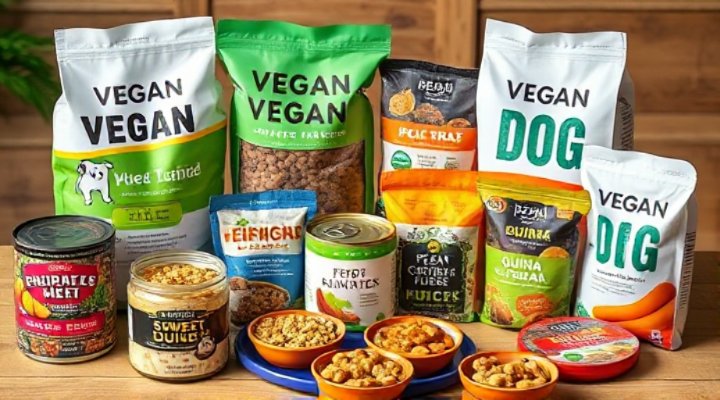Understanding Vegan Dog Food Nutritional Requirements
When considering vegan dog food options, it’s crucial to understand that dogs are omnivores, meaning they can thrive on properly formulated plant-based diets. However, their nutritional needs must be met through careful planning and supplementation. According to research from the American Veterinary Medical Association, dogs require specific nutrients that are typically found in animal products, but these can be obtained from plant sources when properly balanced.
Protein is particularly important for canine health, and plant-based proteins from sources like lentils, chickpeas, and quinoa can provide adequate amounts when combined correctly. Furthermore, essential fatty acids, vitamins, and minerals must be carefully considered. That is to say, transitioning to vegan dog food requires more than simply removing meat; it demands thoughtful formulation to ensure complete nutrition.

Health Benefits of Plant-Based Dog Food Options
The benefits of vegan dog food extend beyond ethical considerations to include significant health advantages. Many pet owners report improved coat condition, better digestion, and reduced allergy symptoms when switching to plant-based diets. For instance, dogs with food sensitivities often find relief with vegan options, as plant-based proteins are less likely to trigger allergic reactions compared to common animal proteins like chicken or beef.
Additionally, plant-based diets typically contain higher fiber content, which promotes healthy digestion and can help maintain optimal weight. Moreover, these diets often have lower fat content, reducing the risk of pancreatitis and other weight-related health issues. Consequently, many veterinarians are now recommending vegan options for specific health conditions, as discussed in our article on dog food allergies and solutions.
Environmental Impact and Sustainability Benefits
One of the most compelling reasons pet owners choose vegan dog food options is the environmental benefit. Animal agriculture significantly contributes to greenhouse gas emissions, water usage, and land degradation. By opting for plant-based pet food, you’re reducing your carbon pawprint and supporting more sustainable food systems.
Furthermore, plant-based dog food production requires substantially less water and land compared to traditional meat-based formulas. This environmental consideration aligns with the growing movement toward organic and sustainable pet food choices that benefit both pets and the planet.

Commercial Vegan Dog Food Options Available Today
The market for vegan dog food has expanded dramatically in recent years, offering numerous high-quality options. From complete kibble formulas to wet food and treats, pet owners now have access to nutritionally balanced plant-based products that meet AAFCO standards. Brands like V-Dog, Wild Earth, and Halo have developed formulas specifically designed to provide complete nutrition without animal ingredients.
When selecting commercial vegan dog food, it’s essential to look for products that have undergone feeding trials and contain added nutrients like taurine, L-carnitine, and vitamin B12. These supplements ensure that your dog receives all necessary nutrients that might be lacking in plant-based ingredients alone. Similarly, consulting with your veterinarian can help you choose the best option for your pet’s specific needs, much like selecting the right real dog food for their requirements.
Homemade Vegan Dog Food Recipes and Preparation
For pet owners who prefer homemade meals, creating nutritionally complete vegan dog food requires careful recipe formulation. Balanced homemade diets should include protein sources like lentils or chickpeas, carbohydrates such as sweet potatoes or brown rice, healthy fats from flaxseed or coconut oil, and essential vitamin and mineral supplements.
However, it’s crucial to consult with a veterinary nutritionist when preparing homemade vegan dog food to ensure proper balance. The USDA Food and Nutrition Information Center provides resources on canine nutritional requirements that can guide your recipe development. Meanwhile, always introduce new foods gradually and monitor your dog’s health closely during transitions.

Responsible Transition to Vegan Dog Food Diets
Transitioning your dog to a vegan diet should be done gradually and under veterinary supervision. Start by mixing small amounts of vegan food with their current diet, gradually increasing the proportion over 2-3 weeks. This slow transition helps prevent digestive upset and allows your dog’s system to adjust to the new food composition.
Regular health monitoring is essential during and after the transition period. Schedule check-ups with your veterinarian to ensure your dog maintains healthy weight, coat condition, and energy levels. Blood tests can help identify any nutritional deficiencies early, allowing for prompt adjustments to their diet or supplementation regimen.
Addressing Common Concerns About Vegan Dog Nutrition
Many pet owners worry about protein quality and quantity in vegan diets. However, when properly formulated, plant-based proteins can provide all essential amino acids dogs need. Combining different plant protein sources creates complete protein profiles that support muscle maintenance and overall health.
Another common concern involves nutrient availability from plant sources. Some nutrients, like iron and zinc, are less bioavailable from plants than from animal products. Consequently, proper formulation and sometimes supplementation are necessary to ensure adequate absorption. This careful attention to nutritional detail mirrors the precision required when choosing specialized diets for sensitive stomachs.

Long-Term Success with Vegan Dog Food Diets
Maintaining your dog on a vegan diet long-term requires ongoing attention to their nutritional status and overall health. Regular veterinary check-ups, including blood work, help ensure they’re receiving adequate nutrition from their plant-based diet. Additionally, staying informed about new research and product developments in vegan pet nutrition allows you to make the best choices for your companion.
Many dogs thrive on well-formulated vegan diets, enjoying excellent health into their senior years. The key to success lies in choosing high-quality commercial foods or preparing properly balanced homemade meals, supplemented as needed based on veterinary guidance. Above all, observing your dog’s energy levels, coat condition, and overall wellbeing provides the best indication of whether their vegan diet is meeting their needs.
In conclusion, vegan dog food offers numerous benefits when implemented responsibly. With proper formulation, transition, and monitoring, many dogs can enjoy healthy, happy lives on plant-based diets while reducing their environmental impact. As with any dietary change, working closely with your veterinarian ensures the best outcomes for your furry family member.
Related Keywords: plant-based dog nutrition, sustainable pet food, vegan dog diet benefits, ethical dog food choices, eco-friendly pet nutrition, animal protein alternatives, complete vegan dog food, homemade vegan dog recipes, environmental impact of pet food, responsible vegan pet ownership

